200425 Economics Assignment 2: Aboriginals, Colonisation, and Business
VerifiedAdded on 2022/09/28
|6
|1731
|31
Essay
AI Summary
This assignment examines the economic impact of British colonisation on Aboriginal Australians, focusing on the historical context and its consequences. It explores the exclusion of Aboriginals from the mainstream economy, analyzing issues like lack of skills, low education levels, and a vicious cycle of economic marginalization. The paper highlights potential economic losses for Australia due to this exclusion. The proposed course of action includes social benefit programs, educational reservations, and government initiatives to increase awareness of Aboriginal culture, with the ultimate goal of integrating Aboriginals into the economy and implementing the Uluru Statement. The essay concludes by emphasizing the need for government support to address historical injustices and promote economic equality and social justice for Aboriginals, thereby improving the Australian economy.
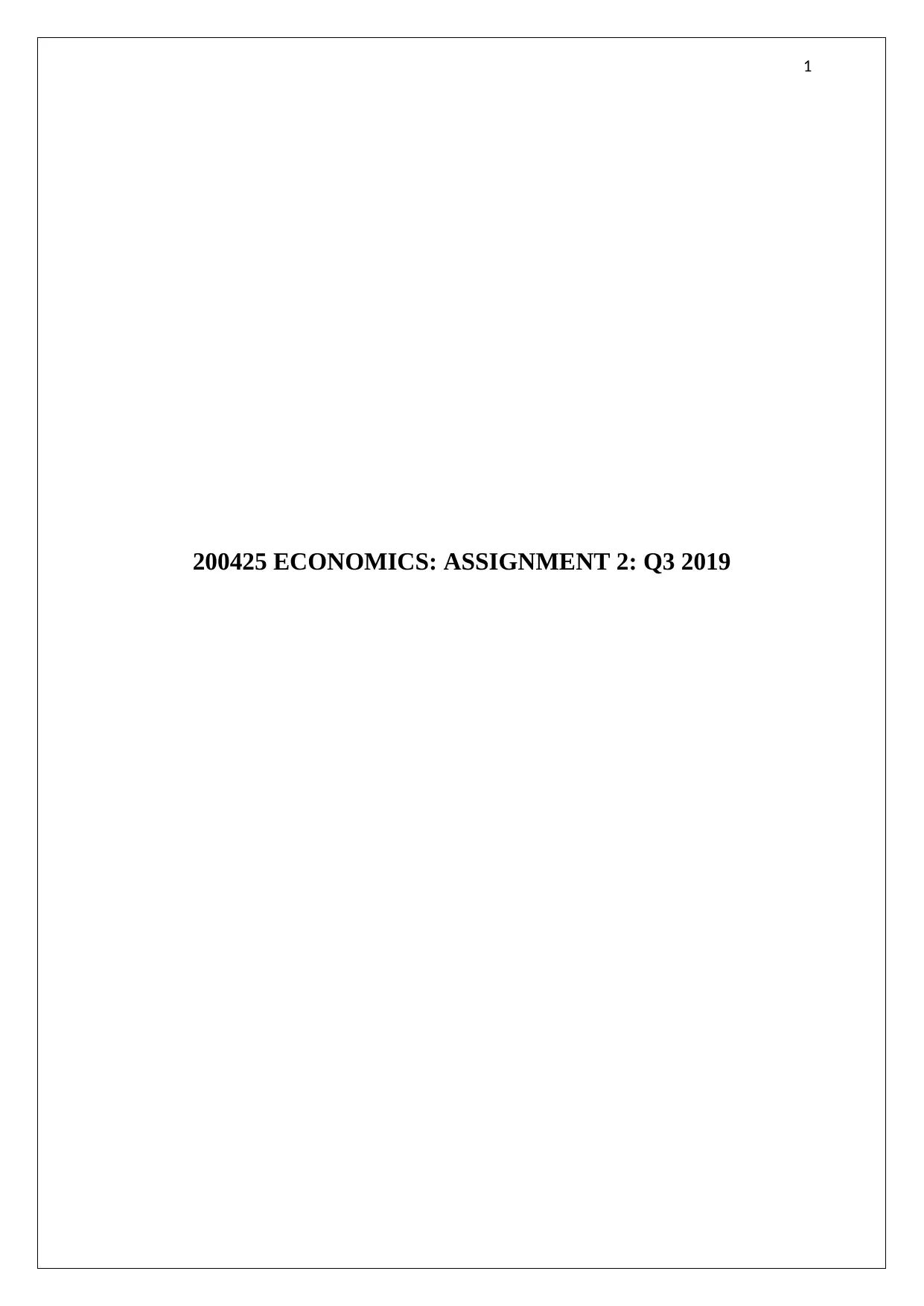
1
200425 ECONOMICS: ASSIGNMENT 2: Q3 2019
200425 ECONOMICS: ASSIGNMENT 2: Q3 2019
Paraphrase This Document
Need a fresh take? Get an instant paraphrase of this document with our AI Paraphraser
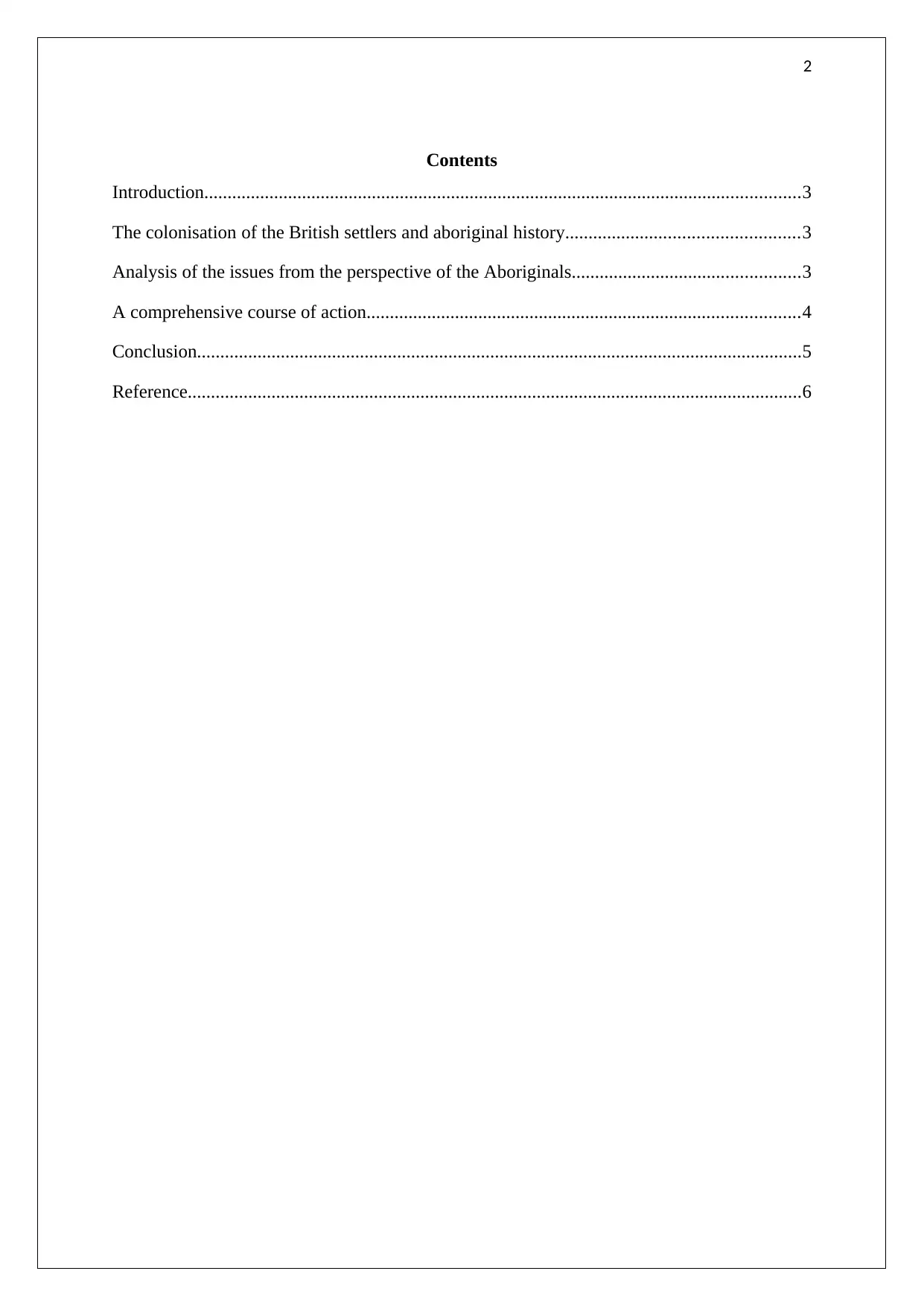
2
Contents
Introduction................................................................................................................................3
The colonisation of the British settlers and aboriginal history..................................................3
Analysis of the issues from the perspective of the Aboriginals.................................................3
A comprehensive course of action.............................................................................................4
Conclusion..................................................................................................................................5
Reference....................................................................................................................................6
Contents
Introduction................................................................................................................................3
The colonisation of the British settlers and aboriginal history..................................................3
Analysis of the issues from the perspective of the Aboriginals.................................................3
A comprehensive course of action.............................................................................................4
Conclusion..................................................................................................................................5
Reference....................................................................................................................................6
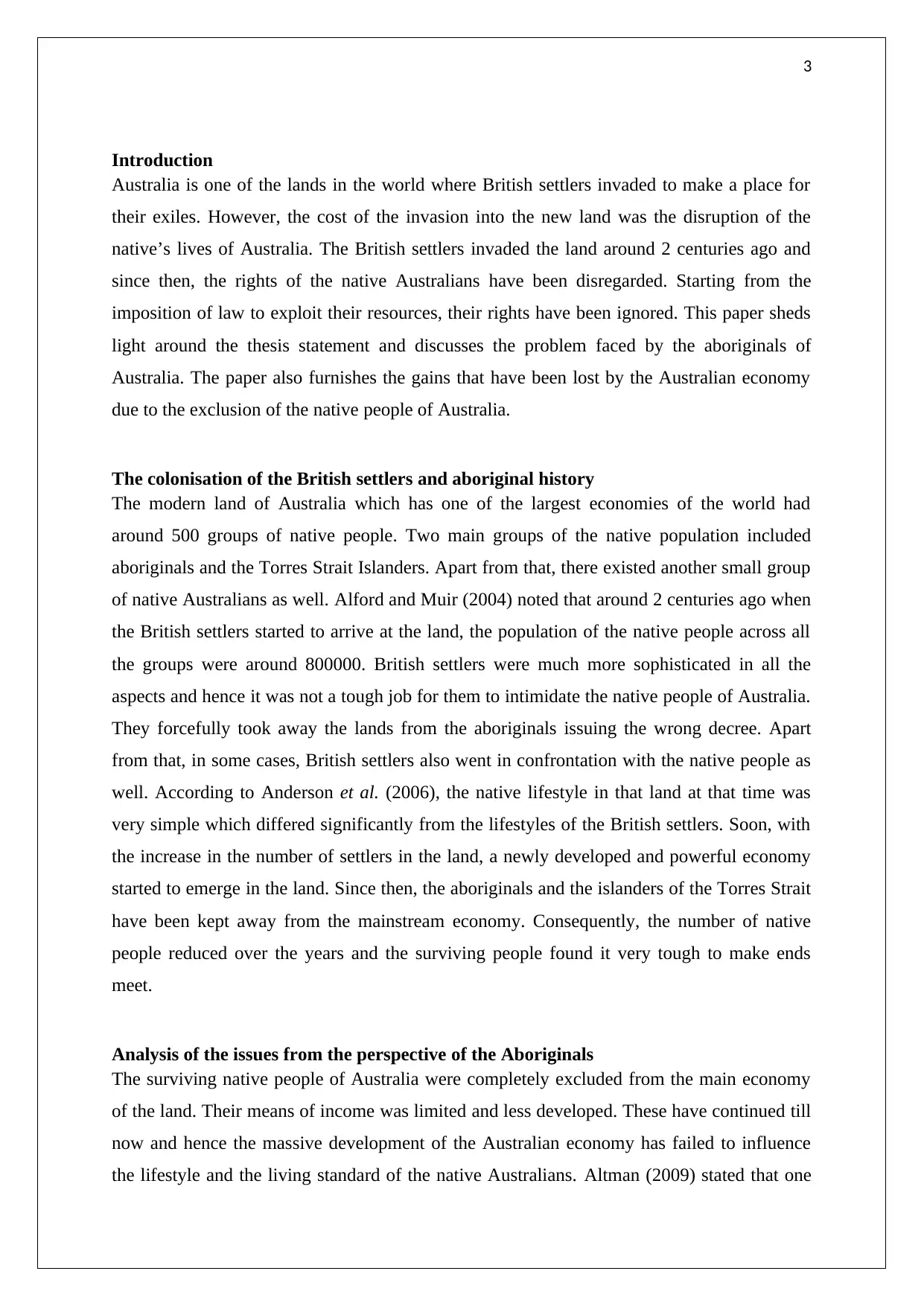
3
Introduction
Australia is one of the lands in the world where British settlers invaded to make a place for
their exiles. However, the cost of the invasion into the new land was the disruption of the
native’s lives of Australia. The British settlers invaded the land around 2 centuries ago and
since then, the rights of the native Australians have been disregarded. Starting from the
imposition of law to exploit their resources, their rights have been ignored. This paper sheds
light around the thesis statement and discusses the problem faced by the aboriginals of
Australia. The paper also furnishes the gains that have been lost by the Australian economy
due to the exclusion of the native people of Australia.
The colonisation of the British settlers and aboriginal history
The modern land of Australia which has one of the largest economies of the world had
around 500 groups of native people. Two main groups of the native population included
aboriginals and the Torres Strait Islanders. Apart from that, there existed another small group
of native Australians as well. Alford and Muir (2004) noted that around 2 centuries ago when
the British settlers started to arrive at the land, the population of the native people across all
the groups were around 800000. British settlers were much more sophisticated in all the
aspects and hence it was not a tough job for them to intimidate the native people of Australia.
They forcefully took away the lands from the aboriginals issuing the wrong decree. Apart
from that, in some cases, British settlers also went in confrontation with the native people as
well. According to Anderson et al. (2006), the native lifestyle in that land at that time was
very simple which differed significantly from the lifestyles of the British settlers. Soon, with
the increase in the number of settlers in the land, a newly developed and powerful economy
started to emerge in the land. Since then, the aboriginals and the islanders of the Torres Strait
have been kept away from the mainstream economy. Consequently, the number of native
people reduced over the years and the surviving people found it very tough to make ends
meet.
Analysis of the issues from the perspective of the Aboriginals
The surviving native people of Australia were completely excluded from the main economy
of the land. Their means of income was limited and less developed. These have continued till
now and hence the massive development of the Australian economy has failed to influence
the lifestyle and the living standard of the native Australians. Altman (2009) stated that one
Introduction
Australia is one of the lands in the world where British settlers invaded to make a place for
their exiles. However, the cost of the invasion into the new land was the disruption of the
native’s lives of Australia. The British settlers invaded the land around 2 centuries ago and
since then, the rights of the native Australians have been disregarded. Starting from the
imposition of law to exploit their resources, their rights have been ignored. This paper sheds
light around the thesis statement and discusses the problem faced by the aboriginals of
Australia. The paper also furnishes the gains that have been lost by the Australian economy
due to the exclusion of the native people of Australia.
The colonisation of the British settlers and aboriginal history
The modern land of Australia which has one of the largest economies of the world had
around 500 groups of native people. Two main groups of the native population included
aboriginals and the Torres Strait Islanders. Apart from that, there existed another small group
of native Australians as well. Alford and Muir (2004) noted that around 2 centuries ago when
the British settlers started to arrive at the land, the population of the native people across all
the groups were around 800000. British settlers were much more sophisticated in all the
aspects and hence it was not a tough job for them to intimidate the native people of Australia.
They forcefully took away the lands from the aboriginals issuing the wrong decree. Apart
from that, in some cases, British settlers also went in confrontation with the native people as
well. According to Anderson et al. (2006), the native lifestyle in that land at that time was
very simple which differed significantly from the lifestyles of the British settlers. Soon, with
the increase in the number of settlers in the land, a newly developed and powerful economy
started to emerge in the land. Since then, the aboriginals and the islanders of the Torres Strait
have been kept away from the mainstream economy. Consequently, the number of native
people reduced over the years and the surviving people found it very tough to make ends
meet.
Analysis of the issues from the perspective of the Aboriginals
The surviving native people of Australia were completely excluded from the main economy
of the land. Their means of income was limited and less developed. These have continued till
now and hence the massive development of the Australian economy has failed to influence
the lifestyle and the living standard of the native Australians. Altman (2009) stated that one
⊘ This is a preview!⊘
Do you want full access?
Subscribe today to unlock all pages.

Trusted by 1+ million students worldwide
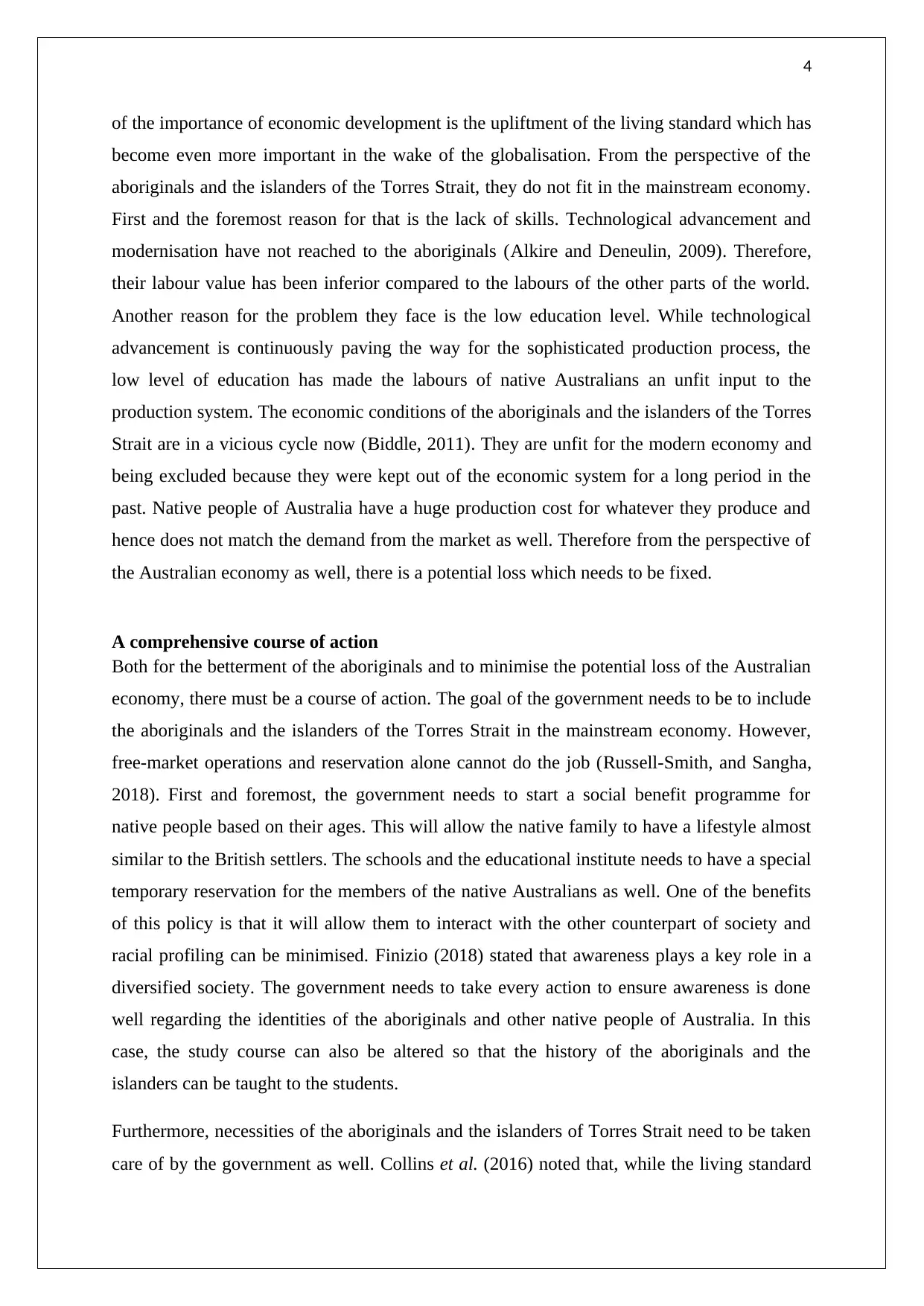
4
of the importance of economic development is the upliftment of the living standard which has
become even more important in the wake of the globalisation. From the perspective of the
aboriginals and the islanders of the Torres Strait, they do not fit in the mainstream economy.
First and the foremost reason for that is the lack of skills. Technological advancement and
modernisation have not reached to the aboriginals (Alkire and Deneulin, 2009). Therefore,
their labour value has been inferior compared to the labours of the other parts of the world.
Another reason for the problem they face is the low education level. While technological
advancement is continuously paving the way for the sophisticated production process, the
low level of education has made the labours of native Australians an unfit input to the
production system. The economic conditions of the aboriginals and the islanders of the Torres
Strait are in a vicious cycle now (Biddle, 2011). They are unfit for the modern economy and
being excluded because they were kept out of the economic system for a long period in the
past. Native people of Australia have a huge production cost for whatever they produce and
hence does not match the demand from the market as well. Therefore from the perspective of
the Australian economy as well, there is a potential loss which needs to be fixed.
A comprehensive course of action
Both for the betterment of the aboriginals and to minimise the potential loss of the Australian
economy, there must be a course of action. The goal of the government needs to be to include
the aboriginals and the islanders of the Torres Strait in the mainstream economy. However,
free-market operations and reservation alone cannot do the job (Russell-Smith, and Sangha,
2018). First and foremost, the government needs to start a social benefit programme for
native people based on their ages. This will allow the native family to have a lifestyle almost
similar to the British settlers. The schools and the educational institute needs to have a special
temporary reservation for the members of the native Australians as well. One of the benefits
of this policy is that it will allow them to interact with the other counterpart of society and
racial profiling can be minimised. Finizio (2018) stated that awareness plays a key role in a
diversified society. The government needs to take every action to ensure awareness is done
well regarding the identities of the aboriginals and other native people of Australia. In this
case, the study course can also be altered so that the history of the aboriginals and the
islanders can be taught to the students.
Furthermore, necessities of the aboriginals and the islanders of Torres Strait need to be taken
care of by the government as well. Collins et al. (2016) noted that, while the living standard
of the importance of economic development is the upliftment of the living standard which has
become even more important in the wake of the globalisation. From the perspective of the
aboriginals and the islanders of the Torres Strait, they do not fit in the mainstream economy.
First and the foremost reason for that is the lack of skills. Technological advancement and
modernisation have not reached to the aboriginals (Alkire and Deneulin, 2009). Therefore,
their labour value has been inferior compared to the labours of the other parts of the world.
Another reason for the problem they face is the low education level. While technological
advancement is continuously paving the way for the sophisticated production process, the
low level of education has made the labours of native Australians an unfit input to the
production system. The economic conditions of the aboriginals and the islanders of the Torres
Strait are in a vicious cycle now (Biddle, 2011). They are unfit for the modern economy and
being excluded because they were kept out of the economic system for a long period in the
past. Native people of Australia have a huge production cost for whatever they produce and
hence does not match the demand from the market as well. Therefore from the perspective of
the Australian economy as well, there is a potential loss which needs to be fixed.
A comprehensive course of action
Both for the betterment of the aboriginals and to minimise the potential loss of the Australian
economy, there must be a course of action. The goal of the government needs to be to include
the aboriginals and the islanders of the Torres Strait in the mainstream economy. However,
free-market operations and reservation alone cannot do the job (Russell-Smith, and Sangha,
2018). First and foremost, the government needs to start a social benefit programme for
native people based on their ages. This will allow the native family to have a lifestyle almost
similar to the British settlers. The schools and the educational institute needs to have a special
temporary reservation for the members of the native Australians as well. One of the benefits
of this policy is that it will allow them to interact with the other counterpart of society and
racial profiling can be minimised. Finizio (2018) stated that awareness plays a key role in a
diversified society. The government needs to take every action to ensure awareness is done
well regarding the identities of the aboriginals and other native people of Australia. In this
case, the study course can also be altered so that the history of the aboriginals and the
islanders can be taught to the students.
Furthermore, necessities of the aboriginals and the islanders of Torres Strait need to be taken
care of by the government as well. Collins et al. (2016) noted that, while the living standard
Paraphrase This Document
Need a fresh take? Get an instant paraphrase of this document with our AI Paraphraser
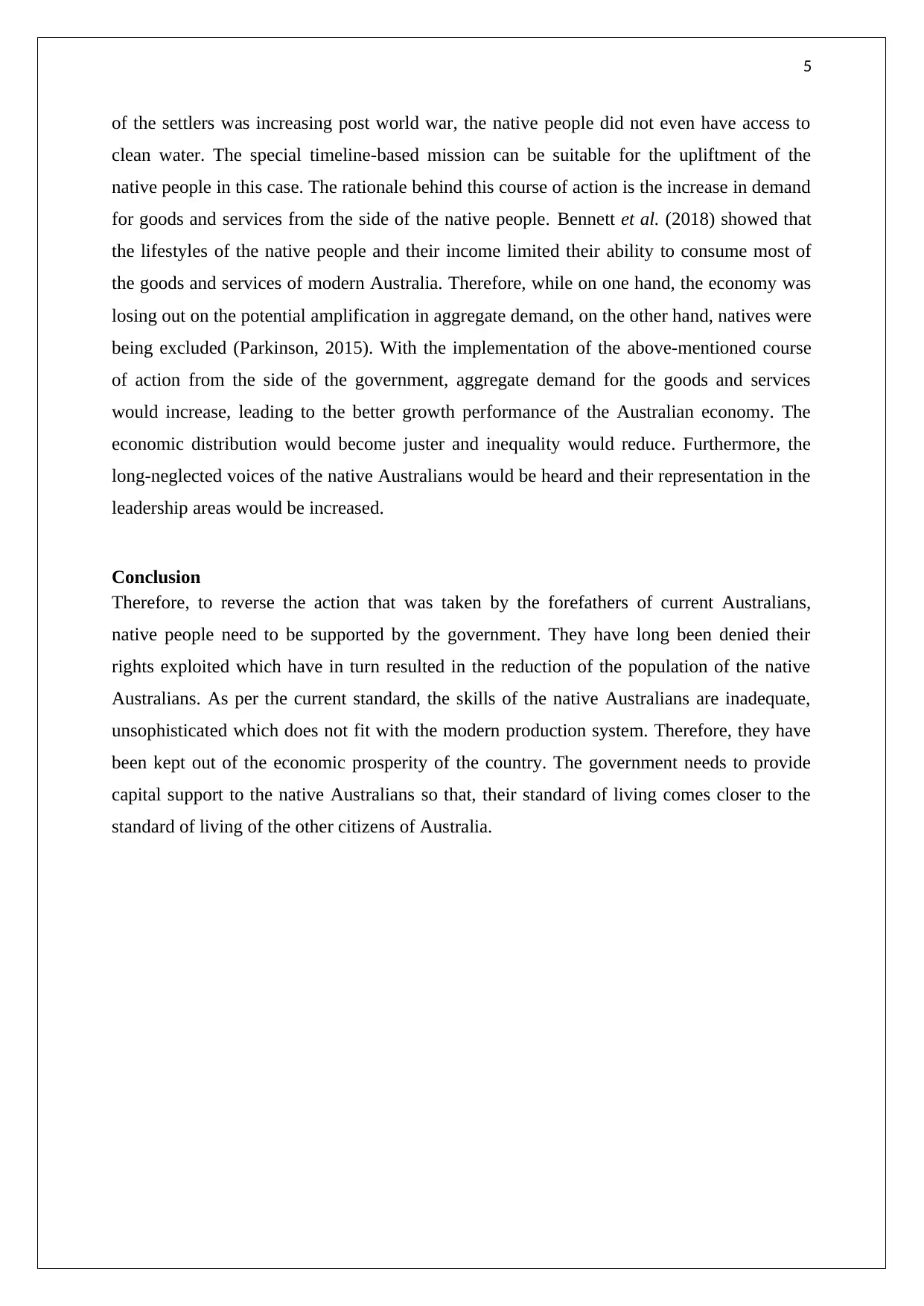
5
of the settlers was increasing post world war, the native people did not even have access to
clean water. The special timeline-based mission can be suitable for the upliftment of the
native people in this case. The rationale behind this course of action is the increase in demand
for goods and services from the side of the native people. Bennett et al. (2018) showed that
the lifestyles of the native people and their income limited their ability to consume most of
the goods and services of modern Australia. Therefore, while on one hand, the economy was
losing out on the potential amplification in aggregate demand, on the other hand, natives were
being excluded (Parkinson, 2015). With the implementation of the above-mentioned course
of action from the side of the government, aggregate demand for the goods and services
would increase, leading to the better growth performance of the Australian economy. The
economic distribution would become juster and inequality would reduce. Furthermore, the
long-neglected voices of the native Australians would be heard and their representation in the
leadership areas would be increased.
Conclusion
Therefore, to reverse the action that was taken by the forefathers of current Australians,
native people need to be supported by the government. They have long been denied their
rights exploited which have in turn resulted in the reduction of the population of the native
Australians. As per the current standard, the skills of the native Australians are inadequate,
unsophisticated which does not fit with the modern production system. Therefore, they have
been kept out of the economic prosperity of the country. The government needs to provide
capital support to the native Australians so that, their standard of living comes closer to the
standard of living of the other citizens of Australia.
of the settlers was increasing post world war, the native people did not even have access to
clean water. The special timeline-based mission can be suitable for the upliftment of the
native people in this case. The rationale behind this course of action is the increase in demand
for goods and services from the side of the native people. Bennett et al. (2018) showed that
the lifestyles of the native people and their income limited their ability to consume most of
the goods and services of modern Australia. Therefore, while on one hand, the economy was
losing out on the potential amplification in aggregate demand, on the other hand, natives were
being excluded (Parkinson, 2015). With the implementation of the above-mentioned course
of action from the side of the government, aggregate demand for the goods and services
would increase, leading to the better growth performance of the Australian economy. The
economic distribution would become juster and inequality would reduce. Furthermore, the
long-neglected voices of the native Australians would be heard and their representation in the
leadership areas would be increased.
Conclusion
Therefore, to reverse the action that was taken by the forefathers of current Australians,
native people need to be supported by the government. They have long been denied their
rights exploited which have in turn resulted in the reduction of the population of the native
Australians. As per the current standard, the skills of the native Australians are inadequate,
unsophisticated which does not fit with the modern production system. Therefore, they have
been kept out of the economic prosperity of the country. The government needs to provide
capital support to the native Australians so that, their standard of living comes closer to the
standard of living of the other citizens of Australia.
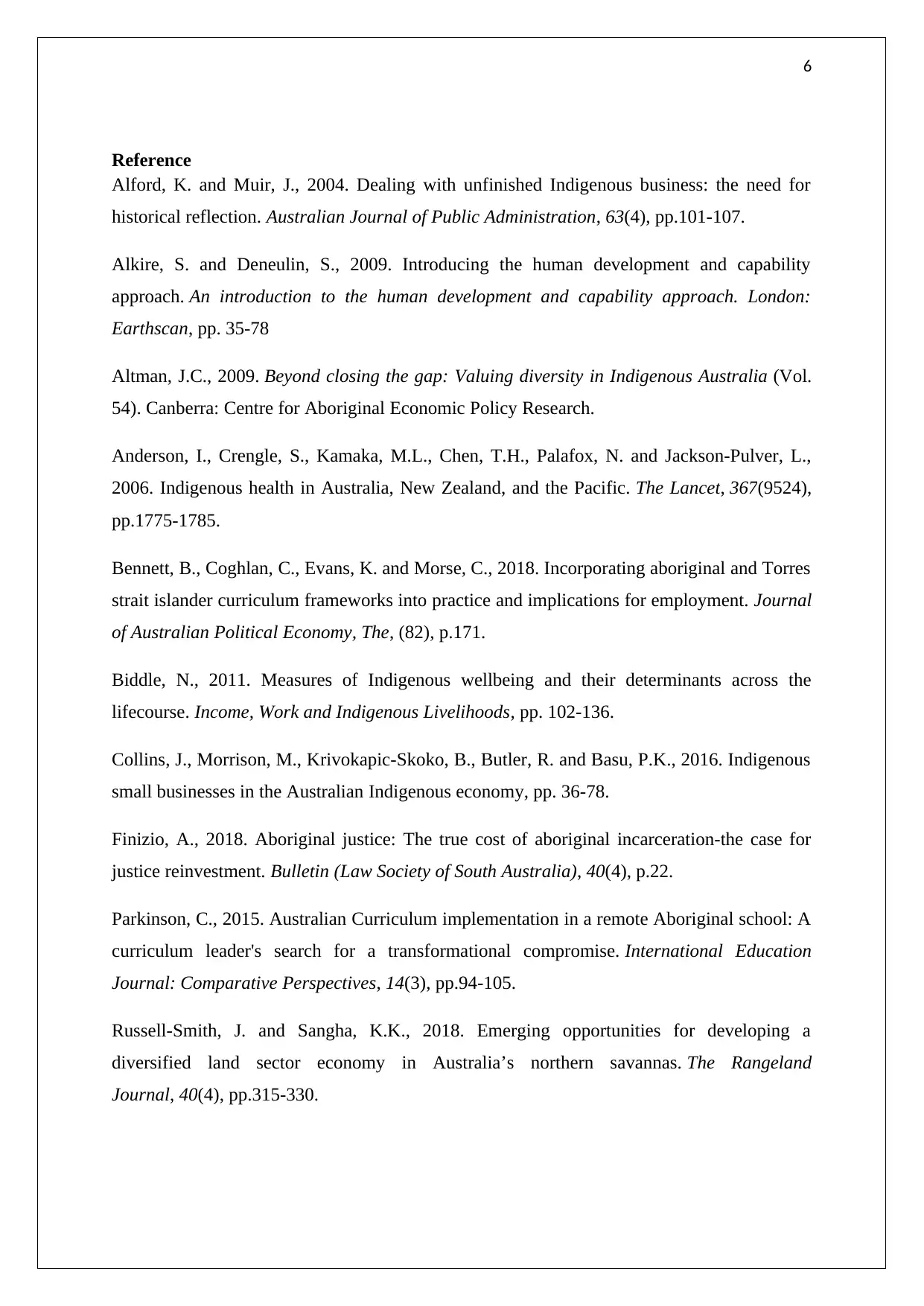
6
Reference
Alford, K. and Muir, J., 2004. Dealing with unfinished Indigenous business: the need for
historical reflection. Australian Journal of Public Administration, 63(4), pp.101-107.
Alkire, S. and Deneulin, S., 2009. Introducing the human development and capability
approach. An introduction to the human development and capability approach. London:
Earthscan, pp. 35-78
Altman, J.C., 2009. Beyond closing the gap: Valuing diversity in Indigenous Australia (Vol.
54). Canberra: Centre for Aboriginal Economic Policy Research.
Anderson, I., Crengle, S., Kamaka, M.L., Chen, T.H., Palafox, N. and Jackson-Pulver, L.,
2006. Indigenous health in Australia, New Zealand, and the Pacific. The Lancet, 367(9524),
pp.1775-1785.
Bennett, B., Coghlan, C., Evans, K. and Morse, C., 2018. Incorporating aboriginal and Torres
strait islander curriculum frameworks into practice and implications for employment. Journal
of Australian Political Economy, The, (82), p.171.
Biddle, N., 2011. Measures of Indigenous wellbeing and their determinants across the
lifecourse. Income, Work and Indigenous Livelihoods, pp. 102-136.
Collins, J., Morrison, M., Krivokapic-Skoko, B., Butler, R. and Basu, P.K., 2016. Indigenous
small businesses in the Australian Indigenous economy, pp. 36-78.
Finizio, A., 2018. Aboriginal justice: The true cost of aboriginal incarceration-the case for
justice reinvestment. Bulletin (Law Society of South Australia), 40(4), p.22.
Parkinson, C., 2015. Australian Curriculum implementation in a remote Aboriginal school: A
curriculum leader's search for a transformational compromise. International Education
Journal: Comparative Perspectives, 14(3), pp.94-105.
Russell-Smith, J. and Sangha, K.K., 2018. Emerging opportunities for developing a
diversified land sector economy in Australia’s northern savannas. The Rangeland
Journal, 40(4), pp.315-330.
Reference
Alford, K. and Muir, J., 2004. Dealing with unfinished Indigenous business: the need for
historical reflection. Australian Journal of Public Administration, 63(4), pp.101-107.
Alkire, S. and Deneulin, S., 2009. Introducing the human development and capability
approach. An introduction to the human development and capability approach. London:
Earthscan, pp. 35-78
Altman, J.C., 2009. Beyond closing the gap: Valuing diversity in Indigenous Australia (Vol.
54). Canberra: Centre for Aboriginal Economic Policy Research.
Anderson, I., Crengle, S., Kamaka, M.L., Chen, T.H., Palafox, N. and Jackson-Pulver, L.,
2006. Indigenous health in Australia, New Zealand, and the Pacific. The Lancet, 367(9524),
pp.1775-1785.
Bennett, B., Coghlan, C., Evans, K. and Morse, C., 2018. Incorporating aboriginal and Torres
strait islander curriculum frameworks into practice and implications for employment. Journal
of Australian Political Economy, The, (82), p.171.
Biddle, N., 2011. Measures of Indigenous wellbeing and their determinants across the
lifecourse. Income, Work and Indigenous Livelihoods, pp. 102-136.
Collins, J., Morrison, M., Krivokapic-Skoko, B., Butler, R. and Basu, P.K., 2016. Indigenous
small businesses in the Australian Indigenous economy, pp. 36-78.
Finizio, A., 2018. Aboriginal justice: The true cost of aboriginal incarceration-the case for
justice reinvestment. Bulletin (Law Society of South Australia), 40(4), p.22.
Parkinson, C., 2015. Australian Curriculum implementation in a remote Aboriginal school: A
curriculum leader's search for a transformational compromise. International Education
Journal: Comparative Perspectives, 14(3), pp.94-105.
Russell-Smith, J. and Sangha, K.K., 2018. Emerging opportunities for developing a
diversified land sector economy in Australia’s northern savannas. The Rangeland
Journal, 40(4), pp.315-330.
⊘ This is a preview!⊘
Do you want full access?
Subscribe today to unlock all pages.

Trusted by 1+ million students worldwide
1 out of 6
Related Documents
Your All-in-One AI-Powered Toolkit for Academic Success.
+13062052269
info@desklib.com
Available 24*7 on WhatsApp / Email
![[object Object]](/_next/static/media/star-bottom.7253800d.svg)
Unlock your academic potential
Copyright © 2020–2026 A2Z Services. All Rights Reserved. Developed and managed by ZUCOL.





